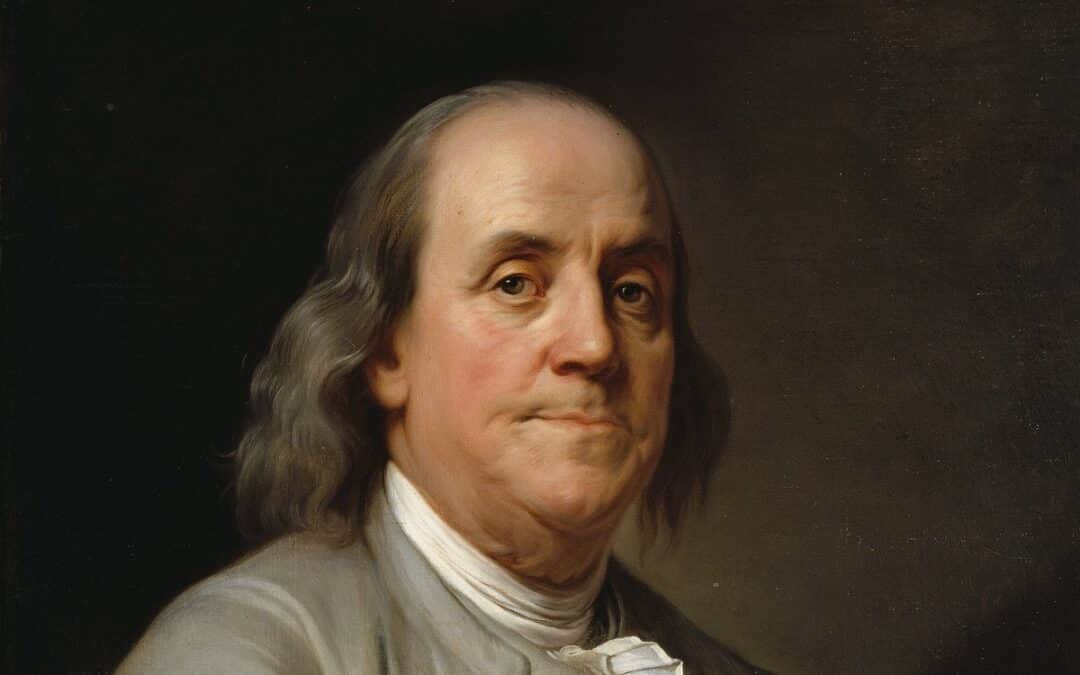Benjamin Franklin was one of the most accomplished individuals to live in the 18th century. Starting off as a successful businessman in the printing industry, he was able to focus on the common issues of the day, become a founding father of a country built upon the concept of a democratically elected government, and was a well known scientist and inventor.
There’s no question that Franklin was an exceptional individual, but how intelligent was Franklin, and do we have a sense of what his IQ test score would be if he took an official modern IQ test today?
IQ tests did not exist in Franklin’s era, however there was an exceptional amount of documentation regarding Franklin that was collected throughout his lifetime. Based on this, it is estimated that Benjamin Franklin’s IQ score would be about 160.
Use our huge list of IQ scores to see how Benjamin Franklin’s IQ compares to other famous people throughout history.
Benjamin Franklin’s Intelligence
The man who would become the world-famous Benjamin Franklin started life as the son of a candle-maker. For many individuals, not being born into a wealthy family determined their careers and outcomes for the rest of their lives. However, Franklin’s intelligence shined through at a young age allowed him to give up his work in his father’s shop and focus on his true passion, reading and writing. His intelligence also managed to get him into college when many others were rejected at their application.
Education wasn’t all that this smart young man managed to do. Though he was a smart young man, he also managed to become one of the Founding Fathers of America. His intelligence allowed him to help draft laws that would shape the country into what it is today and helped create some of the world’s greatest inventions.
At age ten, Franklin was reading adult books. By age twelve he started writing and selling pamphlets. After attending school for two years, he was already a writer of the “New-England” style of writings. College didn’t squash his intelligence either. He studied liberal arts and sciences while there.
When Franklin was 16, he decided to start a newspaper called The New England Courant where he wrote articles under the pseudonym “Silence Dogood”. One of his articles was so popular that his brother, James Franklin started printing it in his own newspaper. Because of this, Ben was able to write every article anonymously, thus allowing him free-speech without having to worry about being caught or punished for what he said.
During college Franklin founded a club called the “Junto”, a club designed for philosophical discussion and debate. The members of this club would discuss politics, morals, philosophy and economics after each meeting. When he was twenty one years old he published his famous Poor Richard’s Almanack.
This intelligence didn’t only help Franklin publish such great works as Poor Richard’s Almanack to help provide for his family. It also helped him be a leading voice in the draft of the Declaration of Independence to help create a country that he could prosper in, not one where intelligence was looked down upon.
Franklin’s intelligence even helped him invent many things such as bifocals, the Franklin stove, and electricity. He is known to be one of the Founding Fathers of America but was also known for many other accomplishments.
Today, Franklin is remembered as one of the Founding Fathers of America and inventors in history for his intelligence that showed through at a young age and intelligence that helped him create many great inventions.
About IQ Scores
An IQ test score is used to indicate a person’s intellectual ability or cognitive capacity. The majority of IQ tests are designed so that the average human intelligence quotient (IQ) is equal to 100. Tests are also designed with standard deviations of 15, so roughly two-thirds of all people will score between 85 – 115 on an IQ test.
IQ tests are often divided into sub-sections, which are used to determine if the subject is verbal or nonverbal. Verbal IQ reflects a person’s ability to analyze language and reason using words, while nonverbal measures of intelligence do not rely on language to solve problems.
As IQ test scores are based on comparisons with other persons of similar age, so a person who takes an IQ test at age 25 can reliably score about the same on the test at age 45.
IQ test scores are used in many contexts, including educational planning, vocational counseling, and clinical settings. They are also used to study IQ distributions of groups within a population.
IQ tests are sometimes criticized for being biased against cultural minorities or low-scoring individuals, although the degree of this bias tends to be highly exaggerated by their critics. This argument is also used in opposition to the practice of treating IQ score as a standard measure of intelligence.
IQ tests are most frequently used in educational, governmental, and clinical settings. They are also sometimes seen in occupations with compulsory licensing or certification standards.
Image credit:
Joseph-Siffred Duplessis, Public domain, via Wikimedia Commons

